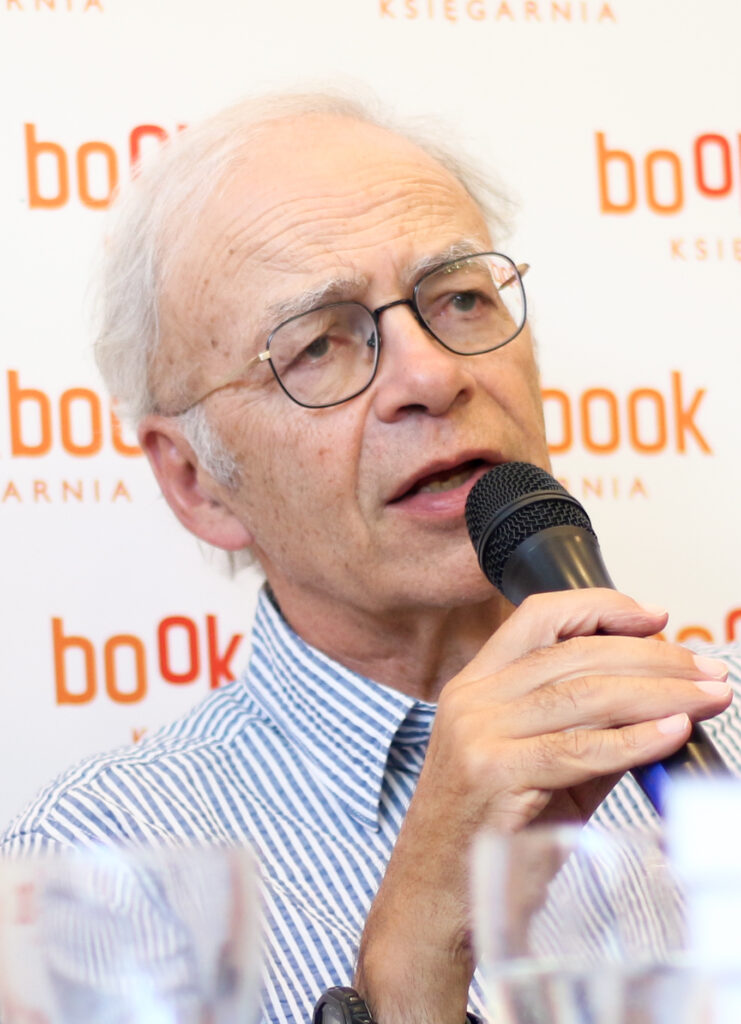Peter Singer

Credit: Ula Zarosa
Licence: CC BY 2.0 via Wikimedia Commons
| Giver: | Individual |
|---|---|
| Receiver: | Other |
| Gift: | Other |
| Approach: | - |
| Issues: | 1. No Poverty, 10. Reduced Inequalities, 12. Responsible Consumption and Production, 13. Climate Action, 14. Life Below Water, 15. Life on Land, 2. Zero Hunger, 3. Good Health and Well-Being, 6. Clean Water and Sanitation, 7. Affordable and Clean Energy, 8. Decent Work and Economic Growth |
Peter Singer (1946-) is an Australian moral philosopher, bioethicist and activist. Among the most influential – and at times controversial – thinkers of his era, Singer helped inspire the modern animal rights movement, while providing the theoretical underpinnings of effective altruism (EA), an approach to philanthropy that leverages research and data analysis to maximize the impact of charitable giving. In his work as a writer and public speaker, Singer has argued that all individuals should embrace altruism as a duty – rather than a personal choice – that is necessary to promote positive change in the world.
Singer’s worldview is rooted in utilitarianism, a system of ethics that evaluates behavior based on the extent to which it promotes well-being and alleviates suffering. He advocates a pragmatic approach to social interventions, guided by the principle that persuading individuals to take positive action is a more effective – and realistic – method than attempting to spur radical systemic change. Singer describes this philosophy of generosity, with its focus on the consequences of people’s deeds, as consequentialism.
Emerged as Leading Animal Rights Activist
Singer was born on July 6, 1946, in Melbourne, Australia, the son of Austrian Jewish immigrants who had fled Europe in the wake of Hitler’s rise to power. After earning a BA and MA in philosophy from the University of Melbourne, Singer traveled to England to attend Oxford University, earning his B.Phil. in 1971. The devastating cyclone that hit Bangladesh that same year inspired Singer’s seminal essay “Famine, Affluence and Morality” (1972), in which he first elucidated his belief that people from wealthy societies had a moral obligation to help combat poverty and other challenges confronting low-income nations.
During his Oxford years Singer also became involved with a vegetarian student group, which prompted him to explore the ethics of eating meat. The result of his research, Animal Liberation, appeared in 1975. In this landmark work, Singer exposes the destructive impact of factory farming on livestock, framing his findings within a broader argument against all forms of animal cruelty. A plea for individuals to reshape their lives to avoid causing suffering to living creatures, the book helped raise awareness of animal welfare issues.
These ideas informed Singer’s approach to other ethical questions, including medical research, environmental protection and euthanasia, many of which he explores in Practical Ethics (1979). At times Singer’s pragmatic approach to moral issues has provoked a backlash from certain groups – as when he asserted that parents should have the right to euthanize babies exhibiting severe disabilities, a position that appalled and angered disability advocates.
Promoted Public Engagement in Social Causes
In 1999 Singer was appointed Ira W. DeCamp Professor of Bioethics at Princeton University. Influential works from the next two decades include How Are We to Live?: Ethics in an Age of Self-Interest (1995); One World: The Ethics of Globalization (2002); and The Life You Can Save: Acting Now to End World Poverty (2009). The title of this last book lends its name to Singer’s anti-poverty initiative The Life You Can Save, a nonprofit launched in 2013 to help donors identify effective interventions that will optimize their giving.
In 2021 Singer co-founded the Journal of Controversial Ideas, an online publication that provides a platform for provocative essays on a range of issues. Speaking with Daniel A. Gross, Singer described the journal as an “attempt to provide a sort of place that can’t be cancelled, in the sense that discussion can’t be shut down by intimidation.” That same year, Singer won the Berggruen Prize in recognition of a career dedicated to promoting ideas that have helped shape the world for the better. In keeping with the guiding principles of effective altruism, Singer donated the majority of the USD 1 million award to The Life You Can Save and other philanthropic outlets.
Throughout his career, Singer has remained committed to his core philosophy of consequentialism. Above all, his conviction that all life is inherently valuable continues to shape his advocacy efforts. “What is important is the capacity to suffer and to enjoy life,” Singer told Zoë Corbyn in 2023. “We should give equal consideration to the similar interests of all sentient beings.”
Contributor: Stephen Meyer
| Source type | Full citation | Link (DOI or URL) |
|---|---|---|
| Publication |
Corbyn, Zoë. “Philosopher Peter Singer: ‘There’s No Reason to Say Humans Have More Worth or Moral Status Than Animals.’” Guardian, May 21, 2023. |
https://www.theguardian.com/world/2023/may/21/philosopher-peter-singer-theres-no-reason-to-say-humans-have-more-worth-or-moral-status-than-animals |
| Publication |
Gross, Daniel A. “Peter Singer Is Committed to Controversial Ideas.” New Yorker, April 25, 2021. |
https://www.newyorker.com/culture/the-new-yorker-interview/peter-singer-is-committed-to-controversial-ideas |
| Book |
Perry, John, ed. God, the Good, and Utilitarianism: Perspectives on Peter Singer. New York: Cambridge University Press, 2014. |
9781107050754 |
| Book |
Singer, Peter. Ethics in the Real World: 90 Essays on Things That Matter. Princeton: Princeton University Press, 2023. |
9780691237862 |
| Publication |
Tillman, Rachel. “Ethical Embodiment and Moral Reasoning: A Challenge to Peter Singer.” Hypatia 28, no. 1 (Winter 2013): 18-31. |
https://www.jstor.org/stable/23352273 |